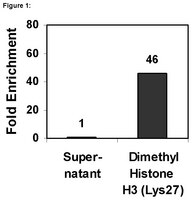17-10108 Sigma-AldrichChIPAb+ Dimethyl-Histone H3 (Lys27) - ChIP Validated Antibody and Primer Set, rabbit monoclonal
This ChIPAb+ Dimethyl-Histone H3 (Lys27) -ChIP Validated Antibody & Primer Set conveniently includes the antibody & the specific control PCR primers.
More>> This ChIPAb+ Dimethyl-Histone H3 (Lys27) -ChIP Validated Antibody & Primer Set conveniently includes the antibody & the specific control PCR primers. Less<<Recommended Products
Overview
| Replacement Information |
|---|
Key Specifications Table
| Species Reactivity | Key Applications |
|---|---|
| Vrt | ChIP, WB, Cell Function Assay |
| References |
|---|
| Product Information | |
|---|---|
| Format | Culture Supernatant |
| Control |
|
| Presentation | Anti-Dimethyl-Histone H3 (Lys27) (rabbit monoclonal). One vial containing 50 µL of cultured supernantant in 0.05% sodium azide. Store at -20°C. Negative Control Supernatant. One vial containing 100 µL of rabbit cultured supernatant in 0.05% sodium azide. Store at -20°C. ChIP Primers, human β-globin. One vial containing 75 μL of 5 μM of each primer specific for the human β-globin promoter. Store at -20°C. FOR: AGG ACA GGT ACG GCT GTC ATC REV: TTT ATG CCC AGC CCT GGC TC |
| Quality Level | MQ100 |
| Physicochemical Information |
|---|
| Dimensions |
|---|
| Materials Information |
|---|
| Toxicological Information |
|---|
| Safety Information according to GHS |
|---|
| Safety Information |
|---|
| Packaging Information | |
|---|---|
| Material Size | 25 assays |
| Material Package | 25 assays per set. Recommended use: ~2 μL of antibody per chromatin immunoprecipitation (dependent upon biological context). |
| Transport Information |
|---|
| Supplemental Information |
|---|
| Specifications |
|---|
| Global Trade Item Number | |
|---|---|
| Catalog Number | GTIN |
| 17-10108 | 04053252518959 |
Documentation
ChIPAb+ Dimethyl-Histone H3 (Lys27) - ChIP Validated Antibody and Primer Set, rabbit monoclonal SDS
| Title |
|---|
ChIPAb+ Dimethyl-Histone H3 (Lys27) - ChIP Validated Antibody and Primer Set, rabbit monoclonal Certificates of Analysis
Brochure
| Title |
|---|
| Advance your Epigenetics Research |











